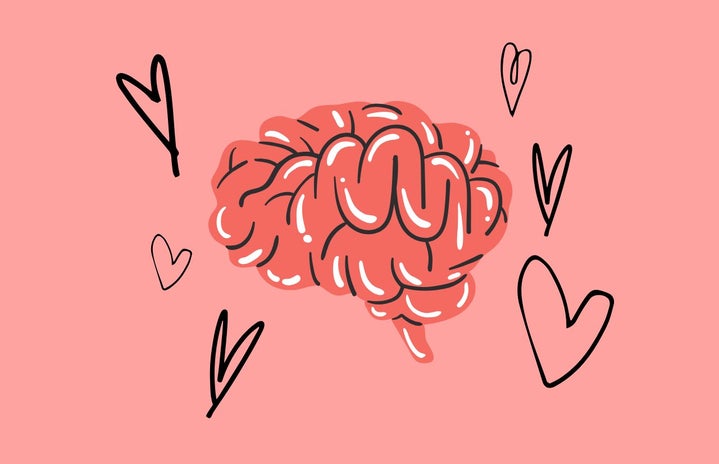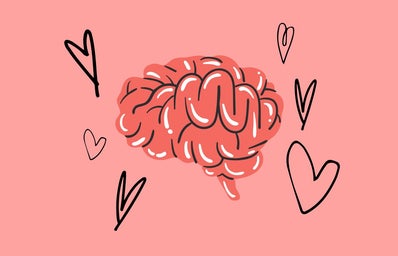Around this time in December, I began writing an article discussing the importance of carrying self-care routines, particularly those developed in quarantine, into life when things were open. My intention was to talk about tips which I had learned in quarantine, both through research and through my own personal efforts, and how to make time for oneself when the public was open and things felt relatively back to normal. At the time, it seemed helpful — things were open, despite feeling different, and I personally had thrown my elaborate quarantine self-care routine out the window in favour of not missing out on anything that allowed me to feel as though I was making up for lost time.
A month later, we’re on the first day of an indisputably disappointing provincial lockdown. At this point in time, the cyclical nature of lockdowns and reopenings has become routine, but no less exhausting. For most students I’ve spoken to, this particular lockdown has been a blow to their mental health.
So, what is COVID burnout? Can you fix it? Can you work around it or through it? I spoke with Laura Fess, a Registered Social Worker and Psychotherapist with VOX Mental Health, to find out. Laura is an attachment and trauma-informed therapist who has over a decade of experience working with youth, families, and couples. Read on to find answers about pandemic fatigue, coping mechanisms, and mental wellness during the pandemic.
CARLY PEWS: What is pandemic fatigue?
LAURA FESS: The WHO describes pandemic fatigue as the response to a prolonged public health crisis- specifically related to the public’s motivation level to continue implementing public health safety measures. However, I believe that most people are experiencing pandemic fatigue that relates more to the symptoms of burnout.
Is pandemic fatigue reversible, or will these feelings stay after the pandemic is over?
Pandemic fatigue would theoretically dissipate once public health safety measures are minimized… However, the impact of ‘COVID Burnout’ could be long lasting as the chronic stress of a pandemic impacts many areas of a person’s life; and can create strain on a persons coping mechanisms, central nervous system, immune system, access to supports (friends/family), economic insecurity, and general mental health.
Do you have any strategies to counter pandemic fatigue?
For COVID burnout I recommend minimizing your energy outputs as much as possible.
- Stick to a simple daily routine that is manageable and includes primarily things you can* control.
- I also recommend minimizing your emotional output: for example, sticking to relationships that are easy* and keeping firm boundaries with relationships that are toxic in nature.
- Movement is so good for us: provoking many positive chemical reactions in our bodies
- Time outside
For many students, social media is an easy pastime during lockdown. However, it’s also very easy to get burnt out by all of the bad news or cynicism online. Do you have any strategies for managing your relationship with social media during the pandemic?
I suggest taking full advantage of the ‘mute’ or ‘block’ features. Genuinely, if relationships are depleting your emotional energy, then they will only exacerbate a burnout-like experience. I suggest ‘playing’ the algorithm. Block things that are triggering and fill your feed with content that brings joy (no joke: cute puppies, feel-good stories, and cake decorating are my go-to’s)
University or college years are often referred to as not only formative but the most fun years in a person’s life. There is something extremely demotivating about recognizing that the college experience has been so heavily affected by the pandemic, and that we won’t get these years back. Do you have any advice for students who feel this loss?
I would 100% validate this and say “you are grieving”… I have learned that you can’t forsake the process, and it’s more effective to feel it all, than to gaslight yourself. If you are angry about this- that is valid. If you are sad about this- that is valid. What I would suggest is to start a vision board for what life looks like after the pandemic- even if it feels far from now, it is STILL a future that you are investing into- every day you go to class, you are one step closer to that future. I would also recommend some sort of a daily gratitude journal- tracking the parts of this season of life that ARE the dream- looking for the gold WHILE grieving.
For students who have “done their parts” (ie: getting vaccinated, social distancing, isolating, etc), and in many ways put their lives on hold in order to do that, it is frustrating and demotivating to see that nothing seems to be helping to end the pandemic or the cycle of lockdowns. Do you have any advice for those struggling with feelings of being responsible for other people who simply don’t care?
THAT is 100% Pandemic fatigue, and it is understandable- even expected. This has been a “2 week” shutdown for almost 2 years… It’s too much. I think that those are real feelings, valid frustrations, and totally normal. What makes it hard is that it can impact our friendships and relationships. To that I would just encourage people that 1) their feelings are valid, 2) to continue to do their best risk assessments for safety 3) create boundaries with relationships that are unhealthy 4) give themselves permission to grieve.
For the initial lockdowns, there was a strong push towards self-care. There are hundreds of thousands of glamorized “morning routines” or elaborate nighttime routines — however, these are often too expensive, time-consuming, or tiring for students who are struggling with burnout. If you were to suggest a self-care routine for a college student struggling in lockdown, what would it look like? Also, do you have any advice for carrying self-care out of lockdown when things open up again?
I would distill it all down to: Eat, Move, Monitor, Connect, Sleep
- Intuitive eating: just being mindful of what your bodies needs day by day and honouring that
- Movement: move your body every day- even if its a simple walk
- Monitor substance use: create boundaries around substances (ex. Pot only on weekends)
- Connect with someone: even if it is small talk with a teller, make a human connection every day.
- Sleep: it can be easy to stay up late binging netflix, but protect your sleep cycle
Even when we weren’t in lockdown, there’s a lot of anxiety about being in social situations at this point in the pandemic. Do you have any strategies for people struggling with pandemic-related social anxiety?
First I would normalize this and say that you are not alone and that MOST people in the room are feeling the exact same way. Start small, add one friend at a time, and don’t shame yourself if it takes a while to get used to a NEW new normal.
Throughout most of the pandemic, young people have been blamed for the spread of the pandemic. However, now more than ever, it is difficult to keep faith in the adults making decisions surrounding COVID the longer the cycle of lockdowns and re-openings continue. Do you have advice for students frustrated as to why we should continue to prioritize being responsible while simultaneously feeling as though we are being used as scapegoats?
Oh man, I hate that that is a lived experience for young people! That would definitely lend to pandemic fatigue. I would say that is valid, frustrating, and would be beyond irritating. The job of a scapegoat is to be the focus of MISPLACED blame- so I would say “that blame has been misplaced, do not let it become internalized — reject the label, take a deep breath, and make the best choice that you can day by day.”
Stress in the pandemic has started to feel like a bit of a yo-yo effect, with good news being followed by bad news and back again. For a lot of students, it makes it difficult to not be cynical of good news, or to be stuck in the state of perpetually waiting for the other shoe to drop. Do you have any tips to start trusting or celebrating good news more?
I think that the suspicion makes sense as it has been a yoyo cycle. What I would suggest is to try as best as you can to stay day-by-day. Whatever today holds: take advantage of it.
There has been a massive push towards therapy and/or reaching for help during this pandemic. Even on social media such as TikTok, many mental health professionals are answering questions that may help those for whom therapy or mental health support is inaccessible. How do you feel about the collective push towards mental health awareness during the pandemic, particularly among young adults? Also, do you have any resources you recommend to young adults at this time?
I think mental health is a natural part of our wellness. We try to feed our body with nutritious food, we move our bodies to maintain strength and flexibility, and have annual physicals, and we take care of our minds. A pandemic is a heavy duty experience that can impact the stress management center of our body (brain)… it’s like being in a car accident: except instead of your body being hurt, your brain is overwhelmed with stress inducing-stimuli. If the pandemic has been “too much” for you, it’s not because you are lacking any kind of competency: it’s because it genuinely has been too much.
Here are some free resources:
CONNEXTONTARIO: 1-866-531-2600
Telehealth Ontario: 1-866-797-0000
Gerstein Centre: 416-929-5200
Kids Help Phone: 1-800-6686868
Distress Centres Ontario: 1-905-688-3711
Assaulted Women’s Helpline: 1866-863-0511
Student Questions
In this section are anonymous questions from university students across Ontario. If you reached out to me with a question for Laura, this is where you’ll find answers!
Are there any strategies you recommend to motivate people to do things you actually enjoy, as opposed to things that need to be done, when burnt out? (as in hobbies, creative outlets, etc)
When we are burned out our motivation is impacted: we are numb, exhausted, and overwhelmed. We are trying to minimize our energy outputs because we have LITTLE energy left. First, I wouldn’t beat yourself up for lacking motivation- the last two years have been exhausting. I would minimize your energy outputs as much as possible. So, if you like quilting, don’t pressure yourself to take on a whole quilt- just pick up thread and fabric and do one patch… Take the pressure off of yourself to perform or produce.
Is it possible that we will have PTSD from the pandemic?
It is definitely possible that many people will experience PTSD-like symptoms, with some meeting the criteria for clinical diagnosis. This pandemic may play out in many people’s central nervous symptoms like a complex trauma.
As a senior, I spend a lot of time thinking about the future. There’s an extreme demotivation in recognizing that things may be opening back up just as the “window” of my college years is closing, and I have lost most of my university experience to the pandemic. Adulthood seems much less exciting after losing so much time I thought was designated to fun. Do you have any advice as to how to look forward to things again?
As an almost 35 year old (yikes) I would say this: never lose the fun! This is not a great sample of your adult years, not even close. BUT you will not be alone in that grief. I am confident that as you move into the next season of your life there will be many others, just like you, ready for relationships, memory making, FUN, travel, exploring and more. It might not have happened yet but there is so much future for you!
Do you have any advice for students who may have family members or friends with opposing views on polarizing topics such as vaccination or lockdown responsibilities?
My favourite quote that i have held onto during this pandemic has been: “The test of a first-rate intelligence is the ability to hold two opposed ideas in the mind at the same time, and still retain the ability to function’ — S. Fitzgerald
I have been trying to do that in my own personal life when coming up against people I love who I cannot see eye to eye with. I try to let empathy lead the way, and try to hold in my mind their view of the world — knowing that my stance will not change. It definitely doesn’t get rid of the tension, but it allows us to realize that everyone has a stance for a reason.
How do you regain the energy to always be doing something productive?
I would take that pressure off of yourself- you cannot always be productive — especially if you are experiencing burn out. I would minimize your energy outputs and just stick to the things you have to do, and the things that bring you joy.
VOX Mental Health is a person-centered, trauma informed counseling practice that is committed to creating a safe, judgement free, supportive environment where you can begin to use your voice. VOX offers both virtual and in-person sessions that service individuals, families, and couples in Ontario, Canada. Currently, in person sessions are being offered in Barrie, Ontario. VOX will be expanding to include London, Ontario in May 2022.
You can find VOX Mental Health on Instagram at @voxmentalhealth, or visit www.voxmentalhealth.com.
If you are experiencing a crisis and are in need of immediate support, please call 911 or contact CRISIS SERVICES with CMHA; 24/7 crisis line @ 705-728-5044 or 1-888-893-8333.


